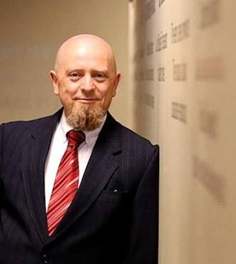David Bellini is the CEO of CyberFox, a trailblazer in the cybersecurity sector, renowned for developing innovative solutions to protect against sophisticated cyber threats. With a foundational education in accounting from the University of Florida, David ventured into the technology landscape by co-founding ConnectWise in 1984 alongside his brother. Under his leadership, ConnectWise blossomed into a tech giant, culminating in a lucrative $1.3 billion acquisition by Thoma Bravo in 2018.
Following this success, David utilized his deep industry knowledge and strategic acumen to establish CyberFox through the strategic integration of PassWord Boss and AutoElevate, targeting the complex challenges of modern cybersecurity. His approach is deeply rooted in innovation, operational excellence, and ethical integrity, driving CyberFox to the forefront of its field.
Beyond his corporate achievements, David Bellini is dedicated to contributing to community development and education. He actively participates on the board of Corbett Preparatory School of IDS, reflecting his commitment to supporting educational initiatives that empower the next generation. David’s career exemplifies visionary leadership and a proactive approach to navigating the evolving cyber landscape.
How do you assess the impact of emerging technologies like blockchain on cybersecurity?
Blockchain presents a fascinating paradox in cybersecurity. Its decentralized nature and cryptographic security offer robust defenses against traditional hacking attempts. However, it also introduces complexities in managing data privacy and tracking transactions. At CyberFox, we are exploring how blockchain can enhance data integrity and transparency in cybersecurity solutions while being mindful of the potential for new vulnerabilities it could introduce.
What measures has CyberFox implemented to ensure ethical AI use in its cybersecurity solutions?
Ethical considerations are paramount when integrating AI into our solutions. We adhere to strict guidelines that ensure transparency, accountability, and fairness in our AI deployments. This includes conducting thorough bias and vulnerability assessments, implementing decision-making frameworks that involve human oversight, and ensuring our AI systems are explainable both internally and to our customers.
Can you discuss a cybersecurity strategy that has significantly benefited CyberFox clients recently?
One strategy that has proven extremely effective is the adoption of zero-trust architectures. By never automatically trusting any entity inside or outside our network, and always verifying before granting access, we’ve significantly enhanced our defensive posture. Implementing this strategy across client environments has led to a measurable decrease in successful breaches, reinforcing the security perimeter by assuming nothing and verifying everything.
How has your leadership approach evolved in the face of global cybersecurity threats?
Global cybersecurity threats require a dynamic and adaptable leadership style. My approach has evolved from focusing predominantly on technological defenses to encompassing a broader risk management perspective. This means not only looking at how to stop attacks but also preparing the organization to respond resiliently when attacks do occur. It involves continuous learning, staying ahead of threat actors, and fostering a culture of security mindfulness across all levels of the company.
What role do you think cybersecurity should play in corporate governance?
Cybersecurity should be integral to corporate governance, akin to financial and operational controls. It should have a clear line of sight from the board level down, with regular reporting and accountability measures. Incorporating cybersecurity into governance frameworks helps ensure that security considerations are part of strategic decision-making processes and not just seen as an IT issue.
In your opinion, what is the biggest misconception businesses have about cybersecurity?
Many businesses still view cybersecurity as an IT problem rather than a strategic imperative. This misconception can lead to underinvestment in necessary security measures until a breach occurs. Cybersecurity should be regarded as a foundational element of business strategy, essential for protecting and enabling all areas of the organization.
How does CyberFox handle the balance between innovation and customer privacy?
Innovation and privacy are not mutually exclusive in our strategy. At CyberFox, we design our solutions with privacy by design principles, ensuring that customer data protection is integral, not an afterthought. This involves using data minimization strategies, ensuring transparency in how data is used, and giving customers control over their information.
Can you describe an instance where CyberFox had to pivot its strategy in response to market changes?
With the sudden increase in remote work due to the pandemic, we quickly pivoted to enhance our solutions around secure remote access. We accelerated the development of security protocols that support distributed work environments without compromising the security posture. This agility helped our clients transition smoothly to new work models while maintaining robust security measures.
What future cybersecurity trends should businesses be aware of right now?
Businesses should be particularly vigilant about the risks associated with the Internet of Things (IoT). As more devices connect to the internet, the attack surface expands dramatically. Businesses need to prepare for this by ensuring that IoT devices are securely integrated into their networks and that they have capabilities to monitor and manage these devices effectively.
Finally, what’s the best piece of advice you’ve ever received and how has it influenced your career?
The best piece of advice I’ve received is to always be curious and never stop learning. This mindset has been instrumental in my career, especially in a field as dynamic as cybersecurity. Embracing continuous learning has not only allowed me to stay ahead of the curve but also fostered a culture of innovation and resilience within CyberFox. It’s a principle that drives our company forward and one that I personally advocate for every day.




